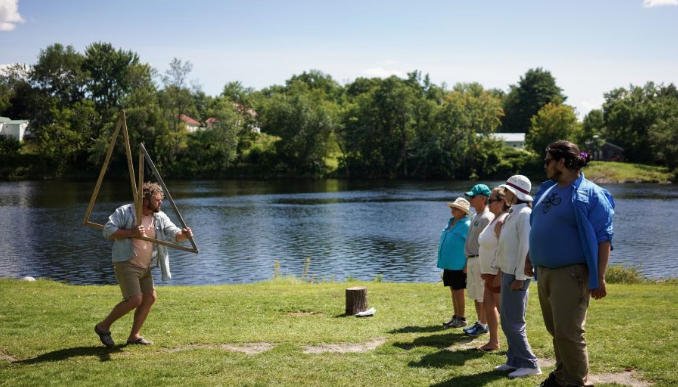
- Details
- By Evan Popp, Maine Beacon
As part of a truth-telling initiative that seeks to illuminate the issue of land claims and the 1980 Settlement Act as well as celebrate the resilience of Indigenous communities, the group Wabanaki REACH has partnered with a Maine-based theater organization to create a play developed by and for Wabanaki people.
The play, titled where the river widens, is an original, community-developed production and is being put on in partnership with Threadbare Theatre Workshop, a group located on the Blue Hill peninsula. The work is the first public offering based on a project in which Wabanaki REACH — an organization supporting Indigenous self-determination through education and other restorative practices — spent a year gathering more than 40 oral history interviews from Wabanaki people and those in Maine about Maine Indian land claims and the 1980 Settlement Act.
As Beacon previously reported, Wabanaki tribes have long argued that the Settlement Act has stifled tribes’ economic development and allowed the state to treat sovereign Indigenous nations as municipalities, creating a paternalistic and unfair relationship that no other federally-recognized tribe is subject to. Given that, the Wabanaki have created a grassroots movement in the last couple years behind reforming the Settlement Act to recognize the tribes’ inherent sovereignty, but opposition from Gov. Janet Mills has stymied such efforts despite broad support for change from the public.
Earlier this year, tribal leaders also attempted to pass a bill to ensure that the Wabanaki would have access to most federal laws that benefit Indigenous tribes around the country. Proponents of that legislation noted that because of the Settlement Act, any federal law enacted after 1980 for the benefit of tribes across the U.S. that impacts the application of Maine law doesn’t apply to the Wabanaki unless they are specifically included in the measure by Congress. However, Mills in June vetoed the measure pushed by tribal leaders to rectify that situation.
Given the power of the stories Wabanaki REACH was able to collect on the subject, Maria Girouard, the group’s executive director, said the organization felt it was important to share those experiences with a wider audience via theater.
“We were so moved by the stories we gathered, it was a natural next step to talk about theater as a way of continuing to move the conversation from the head to the heart, to reach more people, and to gather in community,” Girouard said.
The play is set outdoors along the Penobscot River, which itself has been the subject of land claim disputes and issues related to tribal sovereignty. It stitches together music, song, dance and the interviews from Beyond the Claims: Stories from the Land & the Heart — the name of the Wabanaki REACH truth-telling initiative.
A news release about where the river widens also describes it as a “poetic, spare, lyrical movement through stories, place, and time” and a thought-provoking play that “not only illuminates a complex and tumultuous era, but celebrates the beauty, creativity, and resilience of Wabanaki people.”
Threadbare said they are excited to be working with Wabanaki REACH on the play, which features Lilah Akins, Esther Anne, Nick Bear, Wolatqin Bear, Andrea Francis, Maria Girouard, Dale Lolar, George Loring, Margo Lukens, Joshua McCarey, and Erlene Paul as co-creators and performers.
“Threadbare’s way of co-creating, not only with community members but inspired by them, aligns so beautifully with Wabanaki REACH’s values of connection and joy,” said Kate Russell, artistic director of Threadbare Theatre Workshop. “I am grateful for the generous folks who have come together this summer to create and perform this play — they are brilliant.”
There will be two public performances of the hour-long play on Indian Island on Sept. 16 and Sept. 17 at 5 p.m. With space limited, those who want to attend must register ahead of time to reserve seats by visiting wabanakireach.org.
Help us defend tribal sovereignty.
At Native News Online, our mission is rooted in telling the stories that strengthen sovereignty and uplift Indigenous voices — not just at year’s end, but every single day.
Because of your generosity last year, we were able to keep our reporters on the ground in tribal communities, at national gatherings and in the halls of Congress — covering the issues that matter most to Indian Country: sovereignty, culture, education, health and economic opportunity.
That support sustained us through a tough year in 2025. Now, as we look to the year ahead, we need your help right now to ensure warrior journalism remains strong — reporting that defends tribal sovereignty, amplifies Native truth, and holds power accountable.
 The stakes couldn't be higher. Your support keeps Native voices heard, Native stories told and Native sovereignty defended.
The stakes couldn't be higher. Your support keeps Native voices heard, Native stories told and Native sovereignty defended.
Stand with Warrior Journalism today.
Levi Rickert (Potawatomi), Editor & Publisher

